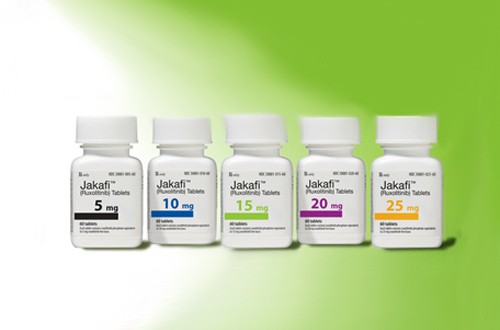
Incyte and Novartis have been hit by the news that a patient on their myelofibrosis treatment Jakafi/Jakavi has developed progressive multifocal leukoencephalopathy (PML), the same side effect that led Biogen Idec’s Tysabri to be suspended from sale in 2005.
A 75-year-old man treated with Jakafi (ruxolitinib) has developed the life-threatening condition – in which the myelin sheath that covers nerves in the brain is destroyed – and an independent investigation is now trying to determine whether the PML case is linked to the drug.
Incyte’s share price fell yesterday as investors tried to gauge the seriousness of the announcement, which comes as a further blow after the UK’s National Institute for Health and Clinical Excellence (NICE) said Jakavi should not be used within the National Health Service on cost-effectiveness grounds.
Ruxolitinib is sold as Jakafi by Incyte in the US and as Jakavi by Novartis elsewhere, and is indicated for patients with intermediate or high-risk myelofibrosis, a rare bone-marrow disease for which there is currently no therapy other than bone marrow or stem cell transplant.
“This is the only known case of PML in the approximately 9,800 myelofibrosis patients treated with ruxolitinib worldwide in clinical trials or with commercial product,” said Incyte in a statement.
“There are reports in the medical literature that suggest that patients with myeloproliferative neoplasms, including myelofibrosis, may be at higher risk of developing PML,” it added.
The drug was approved in the US in November 2011 and in Europe last August and while sales in myelofibrosis have been modest – around $136m in the US in 2012 – potential follow-on indications such as polycythemia vera, essential thrombocythemia and solid tumours could elevate it to blockbuster status, according to analysts.
A link to PML could put a brake on widespread use of Jakafi, although one thing in Incyte and Novartis’ favour is the availability of a diagnostic for the JC virus, an infection which predisposes patients to develop PML. The test from Quest Diagnostics allows doctors to screen for patients who may be at risk of PML and exclude them from therapy.
Tysabri’s tendency to cause the side effect has not stopped the multiple sclerosis (MS) treatment earning significant revenues since it was reintroduced in 2006.
Sales were $1.1bn last year and additional upside is expected now that the Quest kit can be used to screen patients, potentially allowing earlier use of the drug in MS patients.




